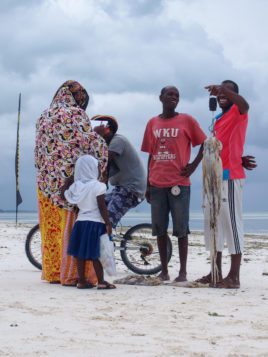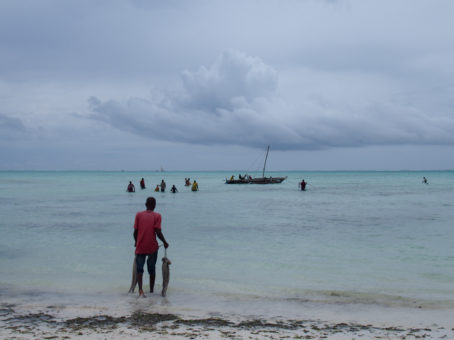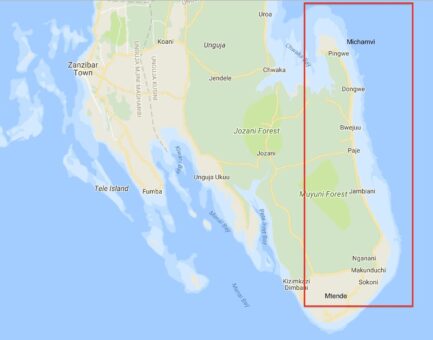For almost 15 years, Blue Ventures has supported coastal communities in Madagascar and beyond with temporary octopus fishery closures, and these communities have experienced dramatic increases in octopus catches and reaped the economic benefits as the fisheries are re-opened. This model has inspired support for more ambitious marine management efforts, including the establishment of some of the largest locally managed marine areas in the western Indian Ocean.
But in 2017 an effort to replicate the octopus fishery closure model in Zanzibar failed. We are determined to learn the lessons to ensure this does not happen again.
The project was set up on the main island of Unguja, Zanzibar by marinecultures.org in partnership with local-level fisheries organisations, Blue Ventures and Zanzibar’s Fisheries Department.
In October 2017, after a consultation phase, the reefs along 40 km of coastline in southeast Zanzibar were closed to octopus fishing. The area, which is home to 40,000 people and thousands of fishers, was due to re-open to fishing on 05 December 2017. But by early November, poaching in the closed area was so commonplace that the closure organisers were forced to concede that the management project had broken down.

Photo: Steve Rocliffe
So what went wrong?
After the initial awareness raising programme, there was considerable interest from neighbouring communities to be part of the scheme. The early signs indicated that public support was strong.The Fisheries Department, emboldened by high interest in the closure and memories of the success of a similar scheme 13 years previously, pressed for the octopus closure to be expanded. The area to be closed was dramatically increased and the process was accelerated.
But as the scheme grew in size and complexity, community engagement began to break down. Some parts of the fishing community were not sufficiently consulted, and many were not clear about who was responsible for the closure. Without feeling ownership over the management measure, many within communities lost faith in it. And without respect for the closure they were not prepared to help enforce it.
The burgeoning tourist industry has also increased demand for octopus to such an extent that many fishers have switched to harvesting it exclusively. This large new group of fishers not only felt that they stood to lose significant income during the super-sized closure (despite evidence to the contrary), they were part of the fishing community that had not been adequately consulted. It was a major issue.
These fishers soon began to agitate against the temporary closure. They organised demonstrations, vociferously denounced the closure to participating communities and even threatened the implementing partners.
To compound the failure further, the decision to speed up the closure meant that a clear legal framework for managing it was not set up properly. Fishing communities and enforcement authorities were left unsure about whether octopus poaching would be punished, leading to several octopus poachers being released by the government enforcing agents.
News that the closure was not being enforced spread around local communities like wildfire. Coupled with community anger at not being consulted, octopus fishing re-commenced in earnest. The closure was abandoned.
Learning the lessons
Since the breakdown of the closure in late 2017, the organising partners have worked hard to understand and rectify the factors that contributed to its failure. The octopus fishers who were excluded from the engagement process and proved so effective at disrupting the closure have now been properly consulted and brought on-board. Originally operating without a unified voice or clear leadership, they’ve since organised themselves and entered into a productive dialogue with marinecultures.org and Blue Ventures.
As a result, their approach to octopus fisheries has been transformed. marinecultures.org has worked with the community to establish a truly representative committee, who consequently expressed their desire to hold an octopus fishery closure where they are part of the management and enforcement process.
Following wide-ranging community consultations on the closure area and length, this second closure was successfully declared on 24 October 2018, almost a year after the failed attempt. The closure will be two months in total, with community-led management and enforcement organised by the committee. It is also far smaller than the 2017 pilot and therefore more closely aligned with the original model that has proved so successful in Madagascar.

A data collector with an octopus buyer | Photo: Hannah Gilchrist
As our work to support partner organisations continues apace, three key lessons are apparent:
- Firstly, closures must not be scaled up too quickly, which risks leaving the fishing communities unprepared and disengaged.
- Secondly, any potential problems identified with new partners and projects need to be closely monitored to ensure that they are ironed out before a closure begins.
- Thirdly, it must be remembered that if the fundamental tenets of putting communities first, engaging all key stakeholders and building local capacity are ignored, projects will fail.
The lessons all serve to reinforce the reasoning behind our original model; to carry out a successful closure, you must first build trust with local communities through participatory consultation and decision-making, develop and build capacity for local management and surveillance/enforcement, build awareness. As the failure in Jambiani shows, these steps cannot be skipped or fast-tracked! Ultimately, winning the hearts and minds of the local communities is the key.
Read more about our work supporting partners



